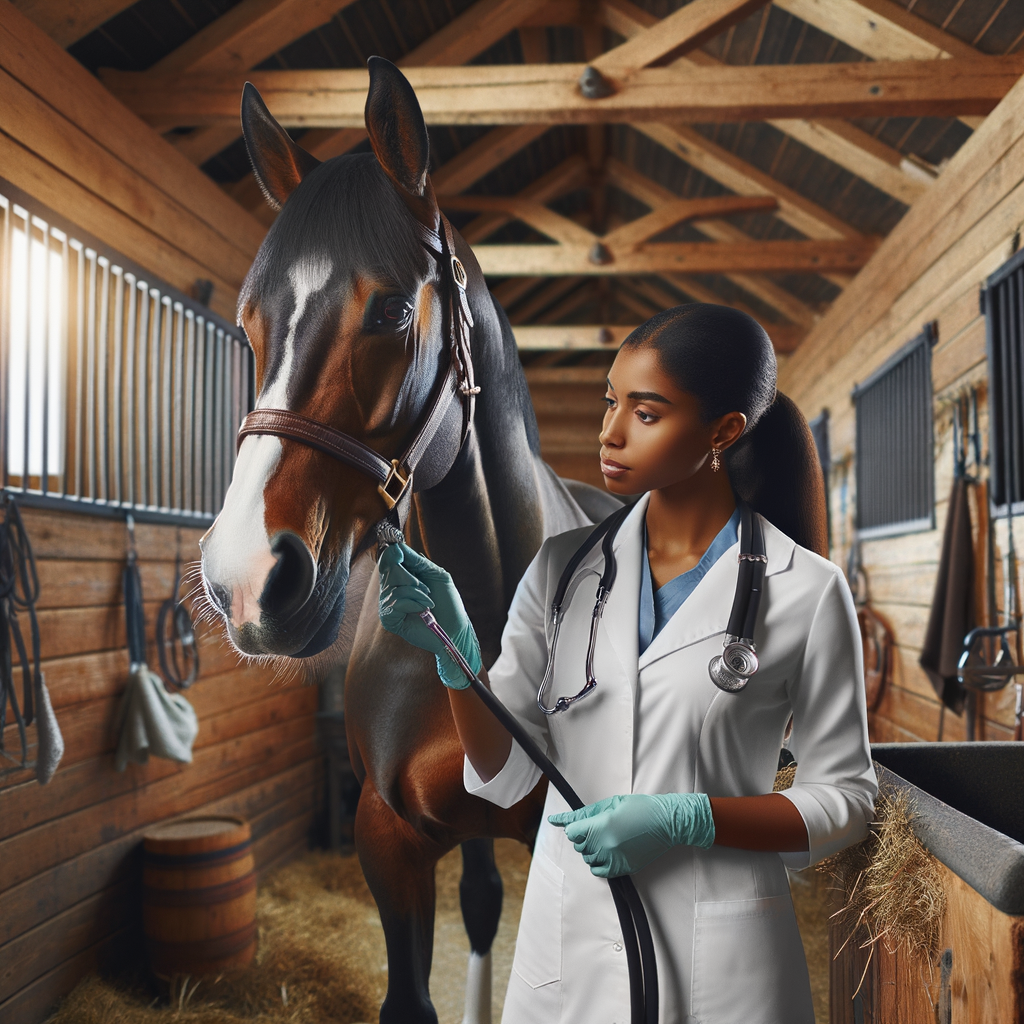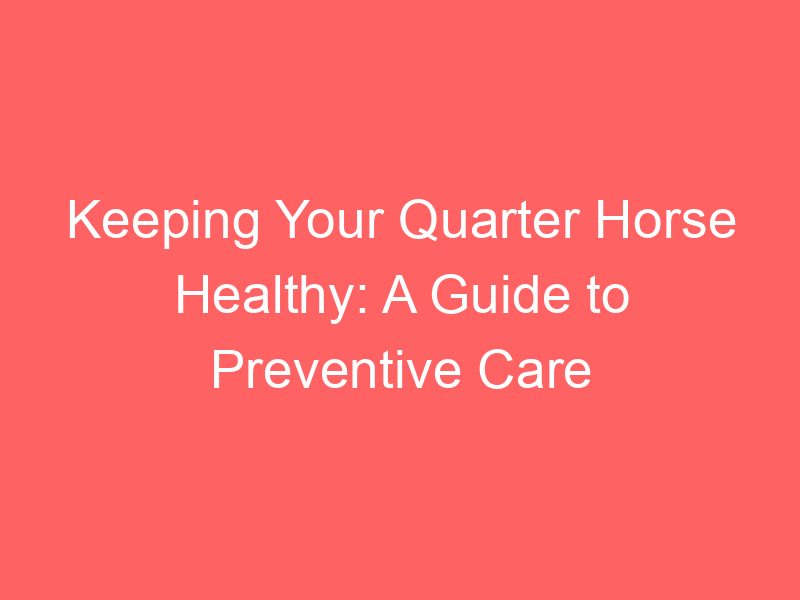
Introduction to Quarter Horse Health Care
Quarter Horses, known for their speed and agility, are a popular breed among horse enthusiasts. However, like all animals, they require specific care to maintain their health and wellbeing. This article will provide an introduction to Quarter Horse health care, focusing on the importance of preventive care and common health issues that these horses may face.
- Understanding the Importance of Preventive Care for Horses
- Overview of Common Health Issues in Quarter Horses
Preventive care is the cornerstone of maintaining a horse’s health. It involves regular check-ups, vaccinations, deworming, and dental care. Regular vet visits can help detect potential health issues before they become serious problems. For instance, a simple dental check can prevent painful tooth conditions that can affect a horse’s ability to eat properly.
Preventive care also includes proper nutrition. A balanced diet is crucial for a horse’s overall health, affecting everything from their weight to their coat’s condition. Feeding your Quarter Horse with the right amount and type of food can prevent many health issues, including obesity and malnutrition.
Despite our best efforts, Quarter Horses can still face health issues. Some of the most common include lameness, colic, and respiratory diseases.
Lameness, or difficulty moving, can result from various causes, including injuries, arthritis, or hoof problems. It’s a common issue in Quarter Horses due to their active lifestyle. Regular vet check-ups can help detect and treat lameness early.
Colic, a severe abdominal pain, is another common health issue. It can be caused by many factors, including a change in diet or a lack of exercise. Immediate veterinary attention is required if a horse shows signs of colic.
Respiratory diseases, such as pneumonia or influenza, can also affect Quarter Horses. These diseases can be prevented through regular vaccinations and proper stable management, including ensuring good ventilation and cleanliness.
In conclusion, understanding and implementing preventive care measures and being aware of common health issues are key to maintaining your Quarter Horse’s health. Remember, a healthy horse is a happy horse!
Preventive Care for Horses: The Basics
Preventive care is a crucial aspect of horse health. It involves taking proactive steps to ensure your horse’s well-being, reducing the risk of illness and injury. Let’s delve into the basics of horse maintenance, focusing on the Quarter Horse breed.
Horse Maintenance 101
There are two primary elements to consider in basic horse maintenance: regular grooming and a balanced diet. Both play a significant role in maintaining the health of a Quarter Horse.
- Regular grooming and its impact on Quarter Horse health
- The role of a balanced diet in maintaining Quarter Horse health
Grooming your horse regularly is not just about keeping them looking good. It’s also about their health. When you groom your Quarter Horse, you’re doing more than just brushing their coat. You’re also checking their skin for any signs of disease or injury, which can be crucial in catching health issues early. According to a study by the University of Kentucky, regular grooming can help prevent skin diseases, which are common in Quarter Horses.
A balanced diet is just as important for horses as it is for humans. Quarter Horses need a diet that provides the right balance of nutrients to maintain their health and energy levels. This includes a mix of grains, hay, fruits, vegetables, and plenty of fresh water. According to the American Quarter Horse Association, a balanced diet can help prevent a range of health issues, from digestive problems to weight issues.
In conclusion, preventive care for horses involves regular grooming and a balanced diet. By incorporating these practices into your horse care routine, you can help ensure your Quarter Horse’s health and well-being.
Quarter Horse Preventive Measures
Keeping your Quarter Horse healthy and happy is a top priority. There are two key preventive measures that can significantly contribute to your horse’s wellbeing: regular exercise and routine vet check-ups.
- Importance of Regular Exercise
- Benefits of Routine Vet Check-ups
Exercise is a crucial part of a Quarter Horse’s health. It helps to keep their muscles strong, their joints flexible, and their mind sharp. Regular exercise also aids in digestion and can help prevent obesity, a common issue in horses. It’s recommended that a Quarter Horse gets at least an hour of exercise each day. This could be in the form of riding, lunging, or free time in a large paddock or field.
Just like humans, horses also need regular check-ups to ensure they’re in good health. A routine vet check-up can help detect any potential health issues early, before they become serious problems. These check-ups typically include a physical examination, dental check, and vaccinations. It’s generally recommended that horses have a vet check-up at least once a year. However, older horses or those with health issues may need more frequent visits.
By incorporating regular exercise and routine vet check-ups into your Quarter Horse’s care routine, you can help ensure they stay healthy and happy for years to come.
Equine Care: Focusing on Quarter Horses
When it comes to the health and wellbeing of Quarter Horses, a proactive approach is essential. This includes a focus on preventive care, which involves regular vaccinations and wellness checks. Let’s delve into the importance of vaccinations for Quarter Horses.
Horse Health Prevention: Vaccinations
Vaccinations play a crucial role in protecting your Quarter Horse from various diseases. They work by stimulating the horse’s immune system to recognize and fight off specific viruses or bacteria.
- Common vaccines for Quarter Horses
- Tetanus: This is a potentially fatal disease caused by a toxin produced by bacteria in the soil.
- Equine Encephalomyelitis: This is a mosquito-borne viral disease that can cause severe neurological illness.
- Rabies: This is a deadly disease that affects the nervous system and is usually transmitted through the bite of an infected animal.
- Equine Influenza: This is a highly contagious respiratory disease caused by the equine influenza virus.
- Understanding the vaccination schedule
There are several vaccines that are commonly recommended for Quarter Horses. These include:
It’s important to follow a regular vaccination schedule to ensure your Quarter Horse remains healthy. Here is a general guideline:
| Vaccine | Initial Dose | Booster Dose |
|---|---|---|
| Tetanus | 6 months | Annually |
| Equine Encephalomyelitis | 6 months | Every 6 months |
| Rabies | 6 months | Annually |
| Equine Influenza | 6 months | Every 6 months |
Please note that this is a general guideline and the exact schedule may vary depending on your horse’s health, lifestyle, and risk factors. Always consult with your vet to determine the best vaccination schedule for your horse.
Quarter Horse Wellness Checks
When it comes to the health of your Quarter Horse, regular wellness checks are essential. These checks help ensure your horse is in top shape and any potential health issues are detected early. Let’s delve into what you can expect during these checks and how often they should be conducted.
- What to expect during a wellness check
- How often should your Quarter Horse have a wellness check
A wellness check for your Quarter Horse is a comprehensive examination conducted by a veterinarian. The vet will check your horse’s vital signs, including heart rate, respiratory rate, and temperature. They will also examine the horse’s body condition, coat, eyes, teeth, and hooves. The vet will listen to your horse’s heart and lungs, and may also perform a lameness evaluation to check for any signs of discomfort or pain. Blood tests may be conducted to check for any underlying health issues. It’s a good time to discuss any concerns you may have about your horse’s health or behavior.
As a general rule, adult Quarter Horses should have a wellness check at least once a year. However, the frequency can vary depending on the horse’s age, health status, and workload. For instance, young horses, senior horses, or those with chronic health conditions may require more frequent checks. Your vet can provide the best advice on how often your horse should be examined.
Remember, regular wellness checks are an investment in your Quarter Horse’s health. They can help detect potential issues early, when they are typically easier and less expensive to treat. So, make sure to schedule these checks as part of your horse’s routine care.
Horse Care Tips: Practical Advice for Owners
As a horse owner, it’s important to know how to take care of your Quarter Horse to ensure its health and happiness. Here are some practical tips on preventive veterinary care for your equine friend.
Preventive Veterinary Care for Quarter Horses
Preventive veterinary care plays a crucial role in maintaining the health of your Quarter Horse. It involves regular check-ups, vaccinations, and other measures to prevent diseases rather than treating them after they occur.
- Choosing the right vet for your Quarter Horse
- Understanding the role of preventive veterinary care
Choosing the right vet is the first step in preventive care. Look for a vet who specializes in horses, as they will have the knowledge and experience to provide the best care for your Quarter Horse. They should be able to perform routine check-ups, administer vaccinations, and provide advice on diet and exercise.
Preventive veterinary care is all about keeping your horse healthy before diseases occur. It includes regular vet visits, vaccinations, deworming, dental care, and proper nutrition. By understanding the role of preventive care, you can ensure your horse stays healthy and happy.
Remember, preventive care is not just about treating diseases, but also about maintaining a healthy lifestyle for your horse. Regular exercise, a balanced diet, and a clean environment are all part of preventive care. By following these tips, you can ensure your Quarter Horse lives a long, healthy life.
Maintaining Quarter Horse Health: Case Studies
Let’s delve into two real-life case studies that illustrate the importance of preventive care in maintaining the health of Quarter Horses.
- Case Study 1: Successful Implementation of Preventive Care
- Case Study 2: The Impact of Neglecting Preventive Care
Meet Daisy, a 7-year-old Quarter Horse from Texas. Daisy’s owner, John, has always been diligent about her preventive care. Regular vet visits, timely vaccinations, and a balanced diet have been the cornerstone of Daisy’s health regime.
John also ensures Daisy gets plenty of exercise and has a clean, comfortable living environment. As a result, Daisy has been in excellent health, with no major illnesses or injuries. This case clearly demonstrates the benefits of a well-implemented preventive care plan.
On the other hand, we have Max, a 6-year-old Quarter Horse from Colorado. Unlike Daisy, Max’s owner, Sarah, did not prioritize preventive care. Max’s vet visits were sporadic, and his vaccinations were often delayed.
Max developed a severe case of colic, a common but potentially deadly condition in horses. His recovery was long and costly, both emotionally and financially for Sarah. This case underscores the potential consequences of neglecting preventive care.
These case studies highlight the importance of preventive care in maintaining the health of Quarter Horses. By investing time and resources into regular vet visits, vaccinations, and proper nutrition, horse owners can significantly reduce the risk of serious health issues.
| Case Study | Preventive Care | Outcome |
|---|---|---|
| Daisy | Regular vet visits, timely vaccinations, balanced diet | Excellent health, no major illnesses or injuries |
| Max | Sporadic vet visits, delayed vaccinations | Severe colic, long and costly recovery |
Remember, preventive care is an investment in your horse’s health and well-being. It’s much easier and cost-effective to prevent a problem than to treat it once it has occurred.
Conclusion: Ensuring Your Quarter Horse’s Health
In this article, we’ve covered a lot of ground on the topic of Quarter Horse health care. Let’s take a moment to recap the key takeaways and discuss the importance of preventive care for these magnificent animals.
- Recap of key takeaways
- Final thoughts on the importance of preventive care for Quarter Horses
Firstly, we learned that preventive care is the cornerstone of maintaining your Quarter Horse’s health. This includes regular vet check-ups, a balanced diet, and a consistent exercise regimen. We also delved into the specific needs of Quarter Horses, highlighting their susceptibility to certain health issues like Navicular Disease and Polysaccharide Storage Myopathy (PSSM).
Practical advice for owners was another key point of our discussion. We emphasized the importance of keeping a close eye on your horse’s behavior and physical condition, as changes can often signal health problems. Additionally, we talked about the benefits of grooming not just for cleanliness, but also as a bonding activity and a chance to check for any abnormalities.
Preventive care for Quarter Horses is not just about avoiding health issues, it’s about ensuring a high quality of life for your horse. Regular vet visits, a proper diet, and adequate exercise are all part of a holistic approach to horse health. By taking these steps, you’re not just preventing disease, you’re promoting overall well-being.
Remember, a healthy horse is a happy horse. And a happy horse makes for a happy owner. So, take the time to invest in your horse’s health – it’s worth every penny and every minute.
In conclusion, caring for a Quarter Horse is a big responsibility, but with the right knowledge and commitment, it can also be a rewarding experience. Here’s to many happy, healthy years with your Quarter Horse!






